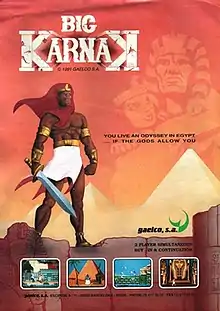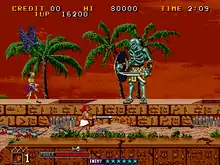Big Karnak
Big Karnak is a 1991 platform arcade video game developed and released by Gaelco.[1][2][3][4][5] Taking place in an Ancient Egypt setting, players assume the role of a pharaoh warrior who embarks on a journey to save his wife while fighting against mythical beings and Egyptian gods. The game was a commercial success for Gaelco and garnered positive reception from critics.[6]
| Big Karnak | |
|---|---|
 | |
| Developer(s) | Gaelco |
| Publisher(s) | Gaelco |
| Director(s) | Julian Goicoa |
| Programmer(s) | Albert Sunyer Luis Jonama |
| Artist(s) | Xavier Arrebola G. |
| Writer(s) | Toni López Yeste |
| Composer(s) | Josep Quingles |
| Platform(s) | Arcade |
| Release | |
| Genre(s) | Platform |
| Mode(s) | |
Gameplay

Big Karnak is a platform game reminiscent of Trojan and Ghouls 'n Ghosts, where players assume the role of a pharaoh warrior who embarks on a journey through four increasingly difficult levels taking place in an Ancient Egypt setting to save his wife by defeating the Egyptian gods Horus, Nut, Isis and Osiris.[7][8][9][10][11][12]
During gameplay, players fight against mythical beings, acquire different weapons, solve puzzles and jump between front and back movement planes while avoiding hazards along the way.[3][9][10][11] Players can also deflect certain enemy projectiles to avoid damage.[10][13] Losing all the energy results in losing a live and the game is over once all lives are lost but players can insert more credits into the arcade machine to continue playing.[13]
Development
Big Karnak was created under the working title El Faraón by a small team at Gaelco, a Spanish game development company co-founded in 1985 by former Tecfri members Luis Jonama, Josep Quinglés and Javier Valero, serving as one of their first arcade projects alongside Master Boy.[14][15][16] Gaelco decided to work on a horizontal-scrolling arcade game similar to Double Dragon, Bad Dudes Vs. DragonNinja and Ghouls 'n Ghosts, recruiting writer Toni López Yeste to create the artwork, scripts and animation.[14][16] Yeste studied comics and illustrations at Escola Joso in Barcelona before being proposed by the school to work at Gaelco, despite never having contact with video games until then.[16][17]
Yeste began writing the script for what would later become Big Karnak in June 1988 and he stated that once the script was shown, Gaelco realized it would work and production of the project began in September of that year.[16] Yeste went to arcades in order to check recent games on the market and study them, with Ghouls 'n Ghosts being the title he studied the most but did not knew Bad Dudes Vs. DragonNinja until production started.[16] Jonama stated in a 2014 interview with the Spanish version of Retro Gamer that he, Quinglés and Valero initially started programming but later directed the games as they grew, with Jonama collaborating on the project as a programmer alongside Albert Sunyer while Quinglés specialized on sound design.[14][16] Julian Goicoa was in charge of marketing the game worldwide but also acted as director and proposed changes from a commercial viewpoint.[14][16] Artist Xavier Arrebola G. also created artwork for the game with Yeste.[14][15][16] Arrebola was first introduced to video games Asteroids during his college days and joined Gaelco in 1989 when Big Karnak was in a more advanced development state due to his interest with computer graphics, being in charge of both character animations and level design.[15][16]
Yeste stated that when production started, several elements from the original script for Big Karnak were added or scrapped due to either not working in the game or being deemed too difficult.[16] Arrebola also stated that team members gave their ideas during development, as equipment and resources were limited, with Yeste claiming that enemies which broke the Egyptian esthetic was due to the collaborative effort.[15][16] Yeste also claimed a total of eight levels were originally envisioned but the number was ultimately reduced to four.[16] When designing the carnivorous plant enemies for a level, Arrebola was inspired by Frank Oz's Little Shop of Horrors.[16] Jonama and the team used PCs with ARPA, an in-house tool created by Gaelco that allowed artists transpose their hand-drawn animation work from graph paper into pixel art.[15][16]
Release
Big Karnak was released on arcades by Gaelco in 1991.[1][16] The game was presented on various trade shows across Europe such as the 1991 European Computer Trade Show.[2] The title was never ported to other systems.[9]
Reception and legacy
According to the book Video Games Around the World, Big Karnak "achieved great success" commercially.[18] David Wilson of Zero magazine rated the game with a 4.5 out of 5 score.[19] Martin Gaksch of German magazine Power Play gave the title a positive outlook.[20] Oldies Rising scored it 15 out of 20.[21] In 2015, David Martinez of Hobby Consolas also gave it a positive outlook.[22] As of April 2020, the rights to Big Karnak were acquired by Piko Interactive.[23]
References
- Akagi, Masumi (13 October 2006). Gaelco, Spain; B. アーケードTVゲームリスト 国内•海外編 (1971-2005) (in Japanese) (1st ed.). Amusement News Agency. pp. 118, 147. ISBN 978-4990251215.
- "Flash: Recreativas Made in Spain". Micromanía (in Spanish). Vol. 2 no. 37. Hobby Press. June 1991. p. 6.
- Forcada, Carlos (May 3, 2014). "Regreso al Pasado: Recreativas españolas — Big Karnak (1991)". MeriStation (in Spanish). PRISA. Archived from the original on 2020-05-15. Retrieved 2020-05-18.
- Fernandez, J. Manuel; Pérez, Jesús Relinque (July 1, 2017). Big Karnak. Continue Play?: Historia de las máquinas recreativas españolas (in Spanish) (1st ed.). Héroes de Papel. pp. 1–288. ISBN 9788494714917.
- Sol, Bruno (September 22, 2017). "Retro: Karnov - El coloso soviético". Vandal (in Spanish). El Español. Archived from the original on July 11, 2019. Retrieved 2020-05-16.
- Tobaños, Curro Gómez (January 2013). "Arcades Olvivados: 10 Joyas De Los Recreativos Que Deberias Jugar". RetroManiac Magazine (in Spanish). No. 7. RetroManiac. pp. 102–111.
- Big Karnak arcade flyer (Gaelco, ESP)
- Big Karnak manual (Arcade, ESP)
- Talley, William (April 2, 2009). "Lost Classics: Big Karnak (Arcade)". Powet.TV. Archived from the original on June 10, 2016. Retrieved 2016-05-20.
- "BIG KARNAK (ARCADE)". VGJunk. May 29, 2014. Archived from the original on October 12, 2016. Retrieved 2016-05-20.
- Andrés, José (May 15, 2015). "BIG KARNAK". Xtreme Retro. Archived from the original on September 24, 2016. Retrieved 2016-05-20.
- "Ending for Big Karnak (Arcade)". vgmuseum.com. Archived from the original on 2016-04-01. Retrieved 2016-05-20.
- Dors, Héctor Sanz (October 20, 2017). "Recreativas españolas: Big Karnak". MeriStation (in Spanish). PRISA. Retrieved 2020-05-25.
- Gaelco (1991). Big Karnak (Arcade). Gaelco. Level/area: Staff.
- Bizarro, Dave (August 8, 2009). "Entrevista Xavier A.G. (GAELCO)". Retrovicio (in Spanish). Drupal. Archived from the original on January 11, 2016. Retrieved 2020-05-18.
- "La Historia De: Big Karnak - Gaelco En Tierras De Faraones; Monstruosidades Del Inframundo; Las Maldiciones De Big Karnak". Retro Gamer (in Spanish). No. 6. Axel Springer SE. January 2014. pp. 110–117.
- "Entrevista Toni López, diseñador y artista en Gaelco". Recreativas.org (in Spanish). Retrolaser. June 4, 2020. Retrieved 2020-06-09.
- J. P. Wolf, Mark; Martínez, Víctor Manuel; Garin, Manuel (May 1, 2015). Spain. Video Games Around the World (1st ed.). MIT Press. p. 525. ISBN 9780262527163.
- Wilson, David (June 1991). "Dosh Eaters - Big Karnak". Zero. No. 20. Dennis Publishing. p. 23.
- Gaksch, Martin (July 1991). "Arcade / Tests: Arcade im Aufwind - Big Karnak". Power Play (in German). No. 39. Future Verlag. pp. 140–141.
- Tanuki (May 2, 2012). "Test de Big Karnak sur Arcade". Oldies Rising (in French). Hosteur. Retrieved 2020-05-25.
- Martínez, David (October 11, 2015). "Los mejores juegos para viajar a Egipto". Hobby Consolas (in Spanish). Axel Springer SE. Archived from the original on October 9, 2017. Retrieved 2020-05-18.
- David; KDarkblade 2 (April 21, 2020). "Piko muestra músculo con la adquisición del catálogo de Gaelco – También anuncia ODT para Nintendo 64 y varios juegos de Vivid Image". RetroManiac (in Spanish). Archived from the original on 2020-06-09. Retrieved 2020-05-27.